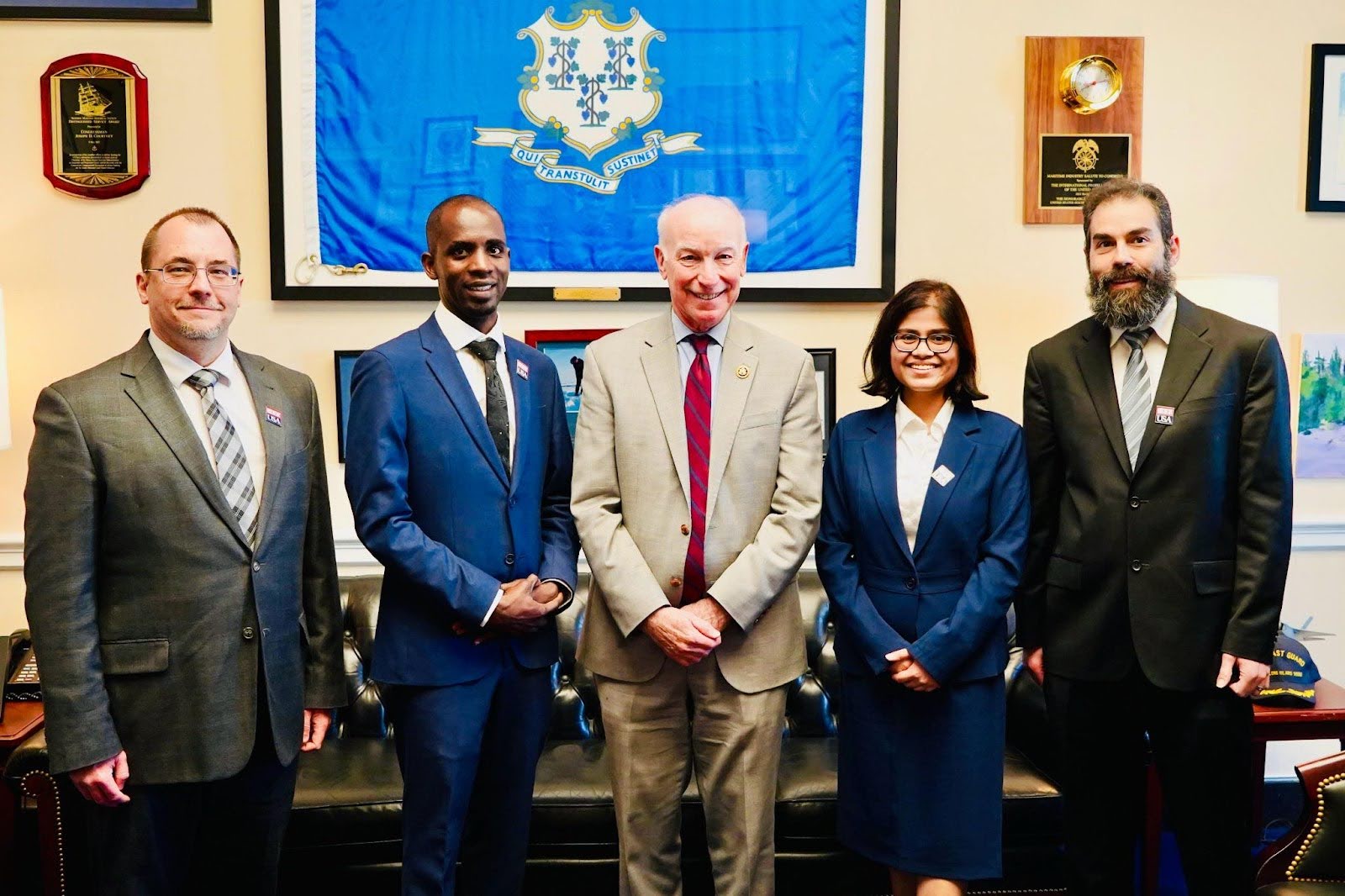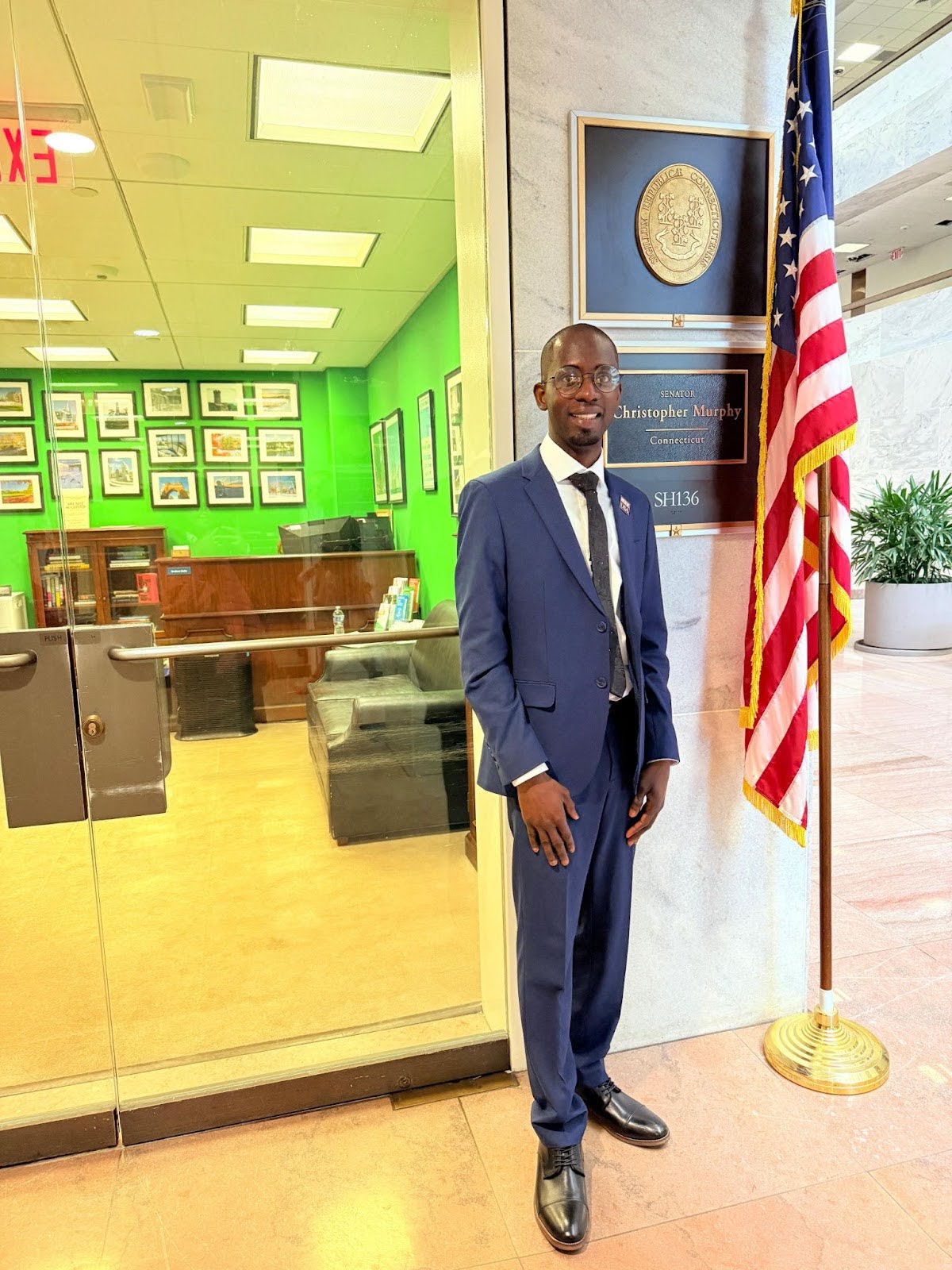
Our team meeting with Representative Joe Courtney, U.S. Representative for Connecticut’s 2nd Congressional District. (L to R): Robert Thoelen III, myself Yusuf Usman, Representative Joe Courtney, Sakshi Naik, and Brian Zahnstecher.
As a delegate from the IEEE Connecticut Section, I had the honor of traveling to Washington, D.C. for the recent IEEE Congress visit. This experience was not just about attending meetings but about championing the legislative priorities of IEEE, which are crucial for advancing technology and benefiting society.
Our focus during the visit was to emphasize the importance of diversifying and expanding access to AI systems, supporting small business technology development, investing in U.S. science and technology, and building a strategic American technology workforce. Each of these priorities is a cornerstone in ensuring that the United States remains at the forefront of technological innovation and security.
One of my key focuses was advocating for small business technology development. Having analyzed small business data in Connecticut, with insights from the Office of the Attorney General, I personally highlighted the challenges and needs of small businesses to the legislators. These businesses are the backbone of innovation and economic growth, and supporting them is vital for a thriving tech ecosystem. Title: Unveiling Cyber Threats: A Comprehensive Analysis of Data Breaches in Connecticut. Read the full article: https://doi.org/10.18260/1-2--45786
Another crucial priority was strengthening the American technology workforce. This includes not only nurturing homegrown talent but also creating a streamlined pathway for high-skilled immigrants, such as international students, to obtain green cards. By easing this process, we can retain brilliant minds and ensure that the U.S. remains a magnet for top-tier talent. This not only helps in maintaining the nation’s edge in technology but also enriches the workforce with diverse perspectives and skills.
Investing in U.S. science and technology and building a robust tech workforce are critical for maintaining global competitiveness. Our discussions underscored the necessity of these investments, not only for economic growth but also for national security and resilience.
The Creative AI Act (H.R. 2385), introduced by Congressman Jay Obernolte (R-CA) and Rep. Don Beyer (D-VA), is a pivotal piece of legislation aimed at making the National AI Research Resource (NAIRR) pilot program permanent. This move is a significant step toward democratizing access to AI resources, especially for small businesses and researchers.
The NAIRR, with its integration of cloud computing and Department of Energy computational assets, including the powerful Oak Ridge National Laboratory's Summit supercomputer, opens doors for innovation by providing small companies and academic institutions access to cutting-edge AI tools. By making this pilot program permanent, the act ensures that researchers and small businesses have continued access to supercomputing power, which can drive breakthroughs in AI development.
By supporting the Creative AI Act, we advocate not just for technological advancement, but also for a future where AI innovation is inclusive, accessible, and beneficial to all.
Walking through the halls of Congress and engaging with policymakers was a profound reminder of the dedication people have to safeguarding humanity and advancing society. It was inspiring to see how deeply these issues resonate with leaders and how committed they are to fostering an environment where technology can thrive.

This visit reinforced my belief in the power of advocacy and the importance of bringing technical expertise to legislative discussions. It’s a reminder that each of us in the tech community has a role to play in shaping the future, ensuring technology serves humanity, and creating a safer world.
About the Author
Yusuf Usman (IEEE CT Section eNotice Coordinator) is a Research Assistant in Cybersecurity at Quinnipiac University, Hamden, CT, USA. His research focuses on cybersecurity, leveraging AI and ML techniques for phishing detection, automated attack and defense strategies, malware detection, and autonomous vehicle security. Yusuf has contributed to NASA-funded research on 6G millimeter-wave Massive MIMO wireless communication, networks, and emerging technologies, including 5G, 6G, and beyond. He has authored and co-authored several research articles on these topics. Yusuf contributed significantly to the empirical analysis of Connecticut's data breaches in 2022, analyzing the data provided by the Office of the Attorney General, Connecticut. His work focused on identifying breach patterns, assessing organizational vulnerabilities, and evaluating the impact on affected entities. His insights played a key role in understanding the cybersecurity landscape within the state and helped inform discussions around data protection strategies and regulatory measures.
Author’s Bio : YUSUF USMAN
Yusuf holds several professional certifications, including: Certified Information Security Manager (CISM) (ISACA), AWS Certified Security – Specialty, Applied Healthcare Cyber Risk Management, Ethical Hacking Penetration Testing IV, CompTIA SecurityX, CompTIA PenTest+, AWS Academy Cloud Security Foundations, and Cloud Foundations Certificate.







